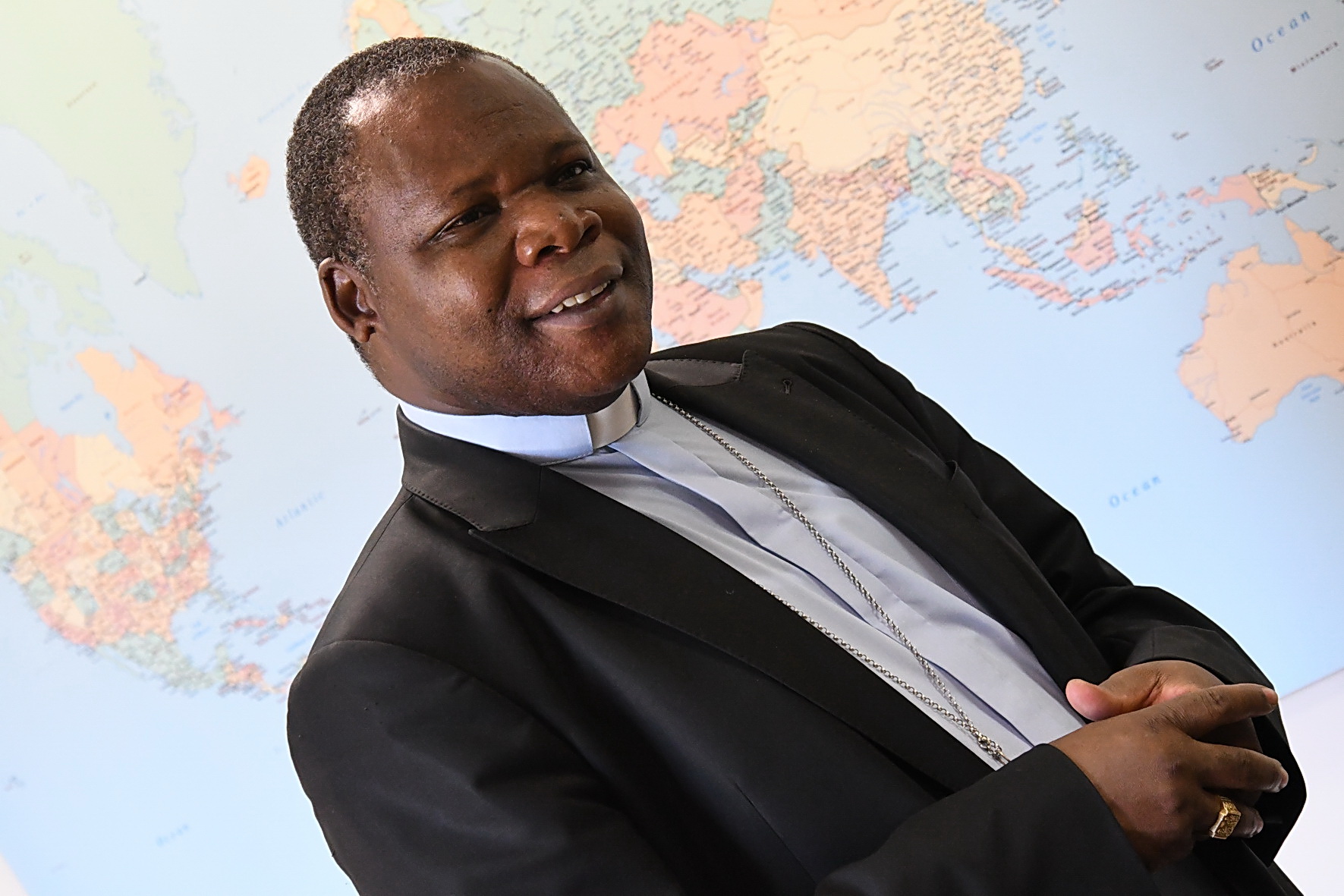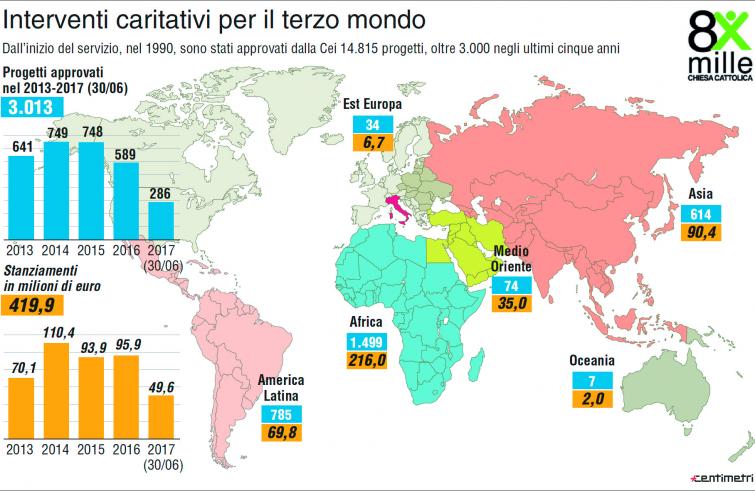Crisis
“Arms are not the solution. It is necessary to hold talks and seek joint solutions to overcome the crisis”, declared Cardinal Dieudonné Nzapalainga, archbishop of Bangui, set to inaugurate 10 new schools in the Country’s largest villages thanks to funds of the Italian Bishops’ Conference – CEI –via the “8 per thousand” tax devolvement Law. “Children must not take up arms to kill but pens and pencils to write”, he said. “They must be good citizens, work and earn an honest living. We don’t want them to be exploited or manipulated”

 “We don’t want the Central African Republic to become Africa’s soft underbelly where all criminals arrive. We want it to be a civilized Country.” Cardinal Dieudonné Nzapalainga, archbishop of Bengui, is determined to carry forward his vision and his projects, despite the fact the ongoing violence in the Central African Republic, and despite the signing of peace agreements past June. Projects include the building of schools to prevent the rebel militia from recruiting children soldiers; along with healthcare facilities in villages. The first 10 schools in the larger villages of Bangui’s archdiocese will be inaugurated in September thanks to the funds devolved under the “8 per thousand” Law– allowing taxpayers to devolve 0.8% of their annual income tax -. The hope is to build as many as 58 schools. The CEI Commission for Charity Works in Third World Countries has already allocated 482,790 Euro to finance the project. “We want the population to recover hope.”
“We don’t want the Central African Republic to become Africa’s soft underbelly where all criminals arrive. We want it to be a civilized Country.” Cardinal Dieudonné Nzapalainga, archbishop of Bengui, is determined to carry forward his vision and his projects, despite the fact the ongoing violence in the Central African Republic, and despite the signing of peace agreements past June. Projects include the building of schools to prevent the rebel militia from recruiting children soldiers; along with healthcare facilities in villages. The first 10 schools in the larger villages of Bangui’s archdiocese will be inaugurated in September thanks to the funds devolved under the “8 per thousand” Law– allowing taxpayers to devolve 0.8% of their annual income tax -. The hope is to build as many as 58 schools. The CEI Commission for Charity Works in Third World Countries has already allocated 482,790 Euro to finance the project. “We want the population to recover hope.”
As many as 14 529 projects have been brought to completion with “8 per thousand” funds – the law allowing taxpayers to devolve 0.8% of their annual income tax to the Church -, which the Church allocates to Developing Countries (Africa, America Latina, Asia, Eastern Europe, Middle East, Oceania). In the past four-year period (2012/2016), as many as 2.727 projects were approved, totalling 370 432 687.49 Euro. 868 projects were approved since 2016, implemented with a fund of 144,8 million euro, involving 83 Countries and 688 applicant bodies.
We met Cardinal Nzapalainga in Rome.
Why is the school a priority in today’s Central African Republic?
Children must not take up arms to kill but pens to write. They must be good citizens, work, and earn an honest living. We don’t want them to be exploited or manipulated.
The crisis is said to be caused by religious motivations. But we have always said that this is not the case. The school is the place where Catholics, Protestants, Muslims, animists, identify themselves as the children of one same Country. It’s the place where they were born and where they should learn to accept themselves. Studying and playing together thus serves as the meeting ground of different cultures, where they learn to respect each other and work together. Without it they will continue believing that their Muslim or Christian peers are their enemies. We intend to launch another project for agricultural groups within the school environment. We will ask parents to come together to cultivate the crops and sell their products in Bangui, so they may purchase notebooks and clothing for their children who go to school. This will ensure the upkeep of the schools and cover for the teachers’ wages. We have also developed a project for the region of Bangui with the Agronomic Institute of Central Africa to promote industrial agriculture. The project is addressed to graduate students or with higher education degrees. We have enough arable land, and it is possible to carry out agricultural trading activity with other Countries.
Restoring healthcare services is equally important …
In fact we are working on a project in the area of healthcare that is very dear to us. Many healthcare facilities were destroyed in the conflict and there is a shortage of medicines. We would like to set up dispensaries in the villages. People shouldn’t have to walk miles and miles to be treated for malaria. We want the population to continue being treated in their own social environments, without having to travel to the city. This can be done via dispensaries and with the support of a healthcare worker. If not, people will continue dying for trivial diseases, because there are no medicines to treat simple wounds or because they turn to witchcraft. It’s unacceptable that in the 21st century people continue to die for these reasons. The Church is focusing her efforts on the reduction of infant and adult death rates.
There is a tense situation in the area of Bangassou: a few days ago bishop Juan José Aguirre Munoz gave shelter to 2000 Muslims fleeing from anti-Balaka militia. It’s a fragile peace, what’s the solution?
We continue saying that weapons are not the solution. It is necessary to promote open dialogue and jointly identify the solutions to the ongoing crisis.
But some youths want to exploit the crisis to make money and acquire political positions at various levels. As a Church our duty is to convey our prophetic message to say that they have no right to use children as cannon fodder, expandable in the face of enemy fire. Their place is at school, where they can develop the skills they need to earn a living. In the battlefield children are not afraid, they are not aware of the consequences of their actions. They must be rescued and given and education. We don’t want our Country to become a breeding ground of violence and criminals. That’s the reason why we appeal to dialogue, reconciliation and justice.
Those who were stripped of their belongings must be given seeds to plant in the fields, and those left without a home must be helped to rebuild.
Resilience means saying that not everything was lost in the crisis; that we can rebuild something new. We want the crisis to act as a springboard, an opportunity to rebuild a new Central African Republic, accepting all cultures and religions, undertaking the same path together.
Tensions broke out with the UN peacekeeping force (MINUSCA): the local populations claim they are not doing enough to bolster security.
Indeed, there have been problems owing to the fact that MINUSCA has a limited amount of staff and resources. Notwithstanding their priorities, the Central African population does not understand why people are being killed 10 km away from MINUSCA outposts because according to their protocol they cannot intervene beyond that distance. The people and the criminals are aware of this. Civilians are attacked and killed 10km away from them, since MINUSCA peacekeepers can’t assure their presence everywhere. This sparked off a situation of ongoing tensions between the local population and MINUSCA. Our opinion is that every group has its limits and its strengths.
Minusca served the purpose of gaining time, of calming things down, of saving human lives. Rather than throwing out the baby with the bathwater, its achievements, its contribution to stabilizing the situation should be recognised. But there are limits that need to be overcome.
Its presence today is important since we still don’t have a national army. If UN peacekeeping forces should leave all rebel leaders would occupy the villages thereby obtaining the leadership of entire regions. It would be a jungle. We don’t want Central Africa to become Africa’s soft underbelly where all the criminals arrive to attack Cameroon and Chad. We want it to be a civilized Country.